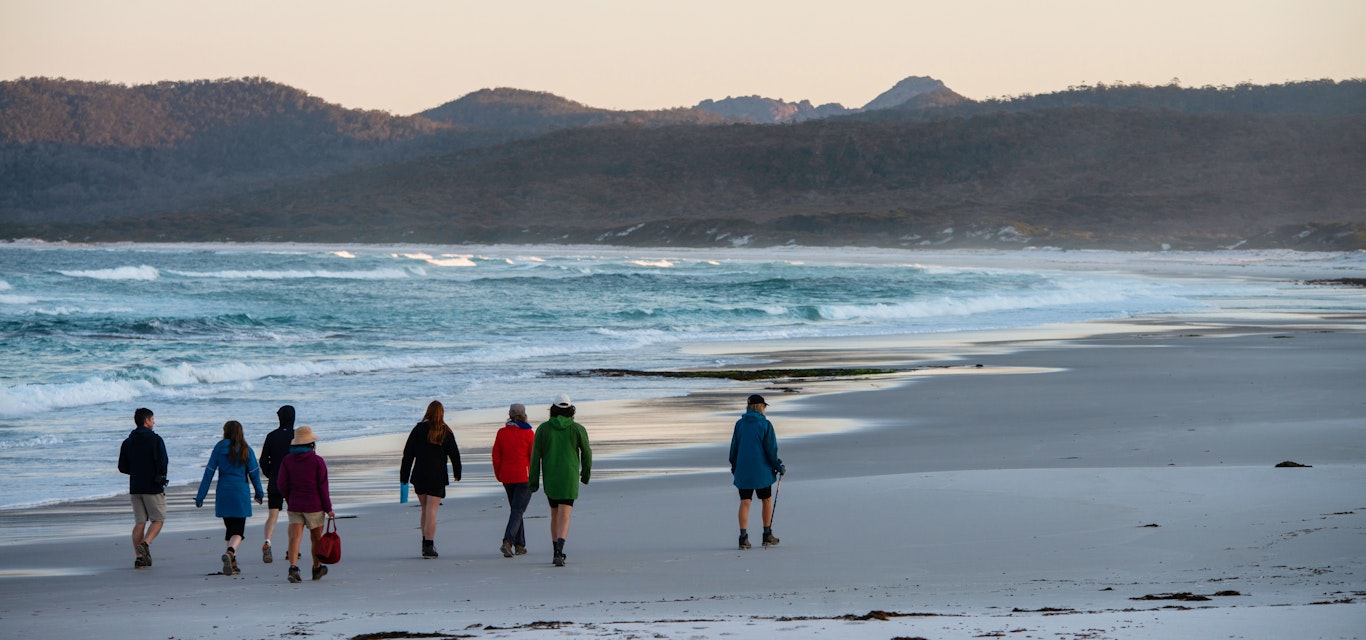It's all in the family
The Freycinet Experience Walk was a pioneer in low-impact environmental tourism when it launched 30 years ago. Chris Crerar dons his hiking boots to experience the special anniversary walk.
It was a vastly different Tasmania three decades ago in 1992 when Joan Masterman and Ken Latona began welcoming guests on their newly established Freycinet Experience Walk; wounds were still fresh from the battle for the Franklin River, the economy was failing and tourism was still a bit of a sideshow. The duo – who had created the pioneering Cradle Mountain Huts Walk five years earlier in 1987 – took a risk by establishing a luxury guided walk on the east coast. Its impact on ecotourism would be significant, yet they would leave only footprints.
Speeding down the coast, passing rugged granite mountains, colonies of seals and soaring sea eagles, a boat trip to remote Schouten Island is a fitting way to begin three days of luxury wilderness adventuring while celebrating the Freycinet Experience Walk’s 30th anniversary.
We step off the boat onto a perfectly isolated beach and hike through wildflower-decorated coastal forest to a lookout halfway up Bear Hill. The view is filled with pink granite peaks surrounded by an aquamarine Tasman Sea. It’s a remarkable landscape free of human development.
... Friendly Beaches Lodge remains a highly regarded example of sensitive ecotourism architecture
A brisk swim in the almost tropical-looking waters means I have a chilly boat trip back, during which I’m imagining the open fire at the Friendly Beaches Lodge. After a short bus ride, we’re strolling along a squeaky white-sand beach towards our accommodation. Our guide Billy challenges us to spot it in the bush; none of us can. She guides us through a small opening in the shrubbery and, after a short walk, the lodge reveals itself.
Credit: Chris Crerar
Credit: Chris Crerar
We’re greeted by our hosts, including Joan’s daughter-in-law, Holly Masterman, and grandson Isaac. A condition of the lodge’s approval back in the early ‘90s, Isaac tells us, was that it couldn’t be visible from the coast. So successful was the design in meeting this condition that it was nicknamed the ‘Invisible Lodge’. With its dark-timber exterior and slope-hugging form, it’s little wonder that the Friendly Beaches Lodge remains a highly regarded example of sensitive ecotourism architecture.
Over Tasmanian cheeses and wine, we learn about the personal values Joan embedded into the Freycinet Experience Walk, often referred to as ‘Joan’s passion project’. Respecting and connecting with the environment and local community are longstanding values.
Joan and Ken ran the program together until the late ‘90s, when they chose to pursue different projects. The Mastermans have operated it independently ever since.
“When you start something as unique as the Freycinet Experience along those guidelines, it’s very easy just to keep track,” Isaac says, also pointing to the sustainability of the experience.
“We’re completely off-grid. Our water is rainwater, our electricity is solar and all waste is managed and removed off-site.”
I sleep soundly in my timber-lined room, waking early to a spectacular day. Wandering around the still-empty lodge, I notice personal touches that have created a home-like ambience. Found objects, collected artworks and an extensive Tasmanian-focused library come together to create a genuinely welcoming space.
A shorter 30th anniversary itinerary and boggy trails caused by a wet winter mean we’re not following the typical second-day schedule. Rather than traversing the peninsula’s southern reaches, we’ll be hiking from near Cape Tourville back to the lodge along Freycinet’s east coast.
Passing a Palawa cultural living site at the start of our hike sparks a conversation about life here prior to European arrival, and the devastation of frontier conflict and subsequent government policies. Our guide, Kari, tells us that this walk follows a Palawa trail, reminding us this is Aboriginal land, with thousands of years of embodied history.
The views along the coast through open woodland grow as we climb the escarpment and skirt clifftops beneath soaring sea eagles. Billy and Kari enrich our experience with plant and animal facts, but also make time for quiet contemplation.
We’re welcomed back to the lodge with plump, creamy local oysters. The focus on relationships with smaller local food and wine suppliers is at the heart of the experience’s ethos and epitomised by the fact that the Freycinet Marine Farm has been supplying its oysters for three decades. These nurtured relationships flow through to the warmth of hospitality we all enjoy at the lodge. It feels like we’ve become part of an extended family. Even the possums on our roof seem to try their best not to wake us. Just as well, too, as we’ve been invited to enjoy sunrise coffee on the beach.
Enjoying a freshly brewed coffee on an untouched stretch of beach as the sun rises over the ocean must be one of life’s unforgettable pleasures. I can’t help but cap it off with a life-affirming plunge in the surf.
We’re guided on a final morning walk around the property. Purchasing these 40ha of bushland enabled the establishment of the Freycinet Experience Walk 30 years ago, and the ongoing care of it is central to everything the experience stands for.
We arrive back to an incredible long-table brunch on the deck. It’s more like a culinary hug than a meal. None of us wants to leave, but a walk along the beach to the bus enables a long goodbye, digestion and contemplation of what a truly sustainable ecotourism experience can be.
